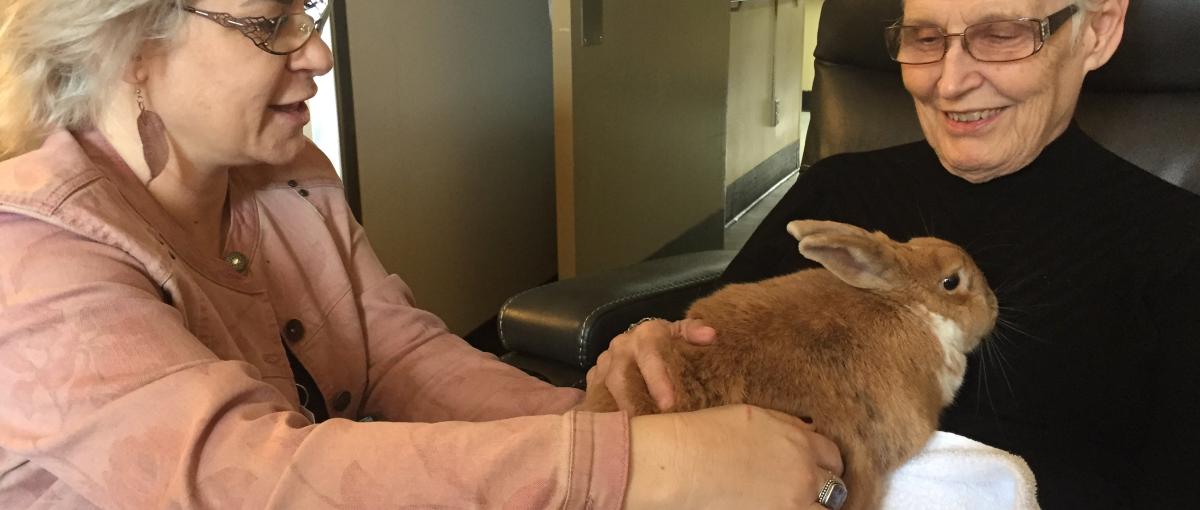Research with therapy rabbit looks at easing loneliness and isolation
Youville Home residents living with dementia participate in animal therapy research

May 8, 2019
By Marguerite Watson, Senior Communications Advisor, Covenant Health
Research into the benefits of animal-assisted therapy often involves horses or dogs, but a study with long-term care residents at Youville Home in St. Albert is using Lily the rabbit.
Myrtle, an 81-year-old resident, tells Lily she's a darling. And Carol, 75, coos as she strokes Lily's back. Both women have advanced dementia, and both have been chosen as participants in the animal therapy study.
The study was launched by Natalie Allouche, Resident Care Manager. She and her colleagues were concerned about the depression and isolation they were observing in some residents living with dementia. They wanted to see whether regular visits with Lily would make a difference.

"We’ve had Lily living here [as a pet] for about 18 months, and just seeing the joy she's brought to some residents made me think we should do a research study on the benefits of animal-assisted enrichment for those with dementia," says Natalie, who has a graduate certificate in animal therapy.
Along with Myrtle and Carol, the study includes eight other residents with severe dementia. All have scored high on depression rating scales and are no longer able to participate in recreation programs like painting or music because of their illness. None had contact with Lily before the start of the research.
"As human beings, we never lose the drive to connect. We just may not know how anymore," says Natalie. "The idea behind the research is to show how interacting with a sentient being such as a therapy animal improves mood, eases feelings of depression and provides a sense of comfort."
Twice a week, Natalie takes Lily in the "Lily mobile"—a basket on a wheeled cart—for a 15-minute visit with the residents, inviting them to interact with the rabbit. She then documents the type of interaction and any responses, like smiling or cooing, she observes during the visits.
So far, most of the responses have been positive, Natalie says. Only one or two residents have consistently shown no interest in interacting with Lily. The majority smile, talk softly to her and stroke her ears. And some offer memories of their own pets or farm animals.
For Myrtle and Carol, the interactions have been joyful, Natalie says. Staff have noticed nurturing behaviour in the two residents, as if the rabbit allows them to connect with "long-forgotten emotions of caring and contentment."
"We're trying to put some normalcy back into socialization for these residents," Natalie says.
The study will run for three months and will soon also include a therapy dog to give residents a choice of interaction and to see whether there is any variation in their responses.
Once Natalie and her colleagues analyze their data, they'll discuss the results with a project partner at the University of Lethbridge who is acting as their research adviser.
"I don't expect the data to show any dramatic long-term improvements since this is something you have to do over and over again. But we're hoping it will show that it does make a difference," Natalie says.
If the results are positive, Natalie plans to apply for funding for a research assistant to do a more formal study with residents. She'd also like to secure funding to make animal-assisted therapy a regular in-house program at Youville Home.
"We're hoping to provide some much-needed contact, stimulation and happiness. Even if it's brief, it counts," Natalie says.